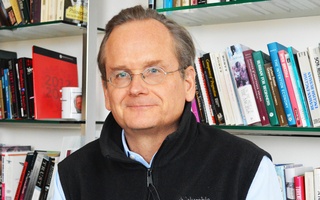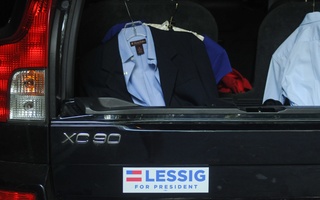Of all the surprising participants who have entered the presidential race this summer, Harvard Law School professor Lawrence Lessig is perhaps the most unexpected. In early September, Lessig—who originally taught international law at the University of Chicago before focusing his attentions on cyberlaw and, later, campaign finance—announced his candidacy for the highest office in the land. His platform is simple: pass comprehensive campaign finance reform and then immediately resign. Lessig's activist campaign might seem fanciful, but it has nevertheless accurately demonstrated the absurdity of our political system.
The core message of Lessig’s campaign—that politics in America today is broken and in desperate need of reform—cannot be ignored. As we have opined in the past, campaign finance should not be the province of the wealthy and well-connected. Lessig is right that the power of money in politics impedes our ability to advance solutions to a myriad of national problems; moreover, the ability of a few to spend heavily in campaign donations skews our system away from its democratic principles. On issues ranging from gun control to climate change, from tax reform to healthcare, from energy policy to infrastructure, major campaign donations from companies and other wealthy benefactors distort the issues at play and unnecessarily preclude otherwise sensible policy fixes.
This problem is exacerbated by the fact that the issue of money in politics runs at a deeper level than most public policy issues. Through its pervasiveness, it affects the very way in which our democracy operates. There is a reason few candidates from either party (except perhaps Donald Trump, ironically) appear interested in speaking out about their campaigns’ funding: Even having a chance at the Oval Office—and at solving this issue from that perch—requires a significant amount of money, and the backing of some rich donors. Into this breach steps Lessig, an outsider with no reasonable shot, nothing to lose, and a campaign with a vague flavor of absurdism.
Despite his long odds, it is commendable that Lessig has taken this opportunity to draw wider attention to the flaws of our political system. If he manages to gain the one percent of national support required to enter the first Democratic debate, Lessig could entirely upend the dynamic of the conversation. The contrast between Lessig and his opponents—a former secretary of state, a sitting senator, a former governor, and a former senator—has the potential to be revealing. It would be particularly interesting to hear Hillary Clinton, the establishment candidate with a giant war chest and strong Wall Street ties, challenged to explain her plans for campaign finance reform.
Even if he cannot or does not get within sight of the White House—or for that matter, the Democratic nomination—Lessig’s entry into the presidential race has already helped to bring attention to the issue of campaign finance. Further, it has helped build pressure on the other Democratic candidates to take firmer stances. We applaud Lessig’s candidacy and his attempts to encourage debate on how to make politics a more equitable playing field, a discussion that we can all hope will lead to action.
Read more in Opinion
A Strange Space
















